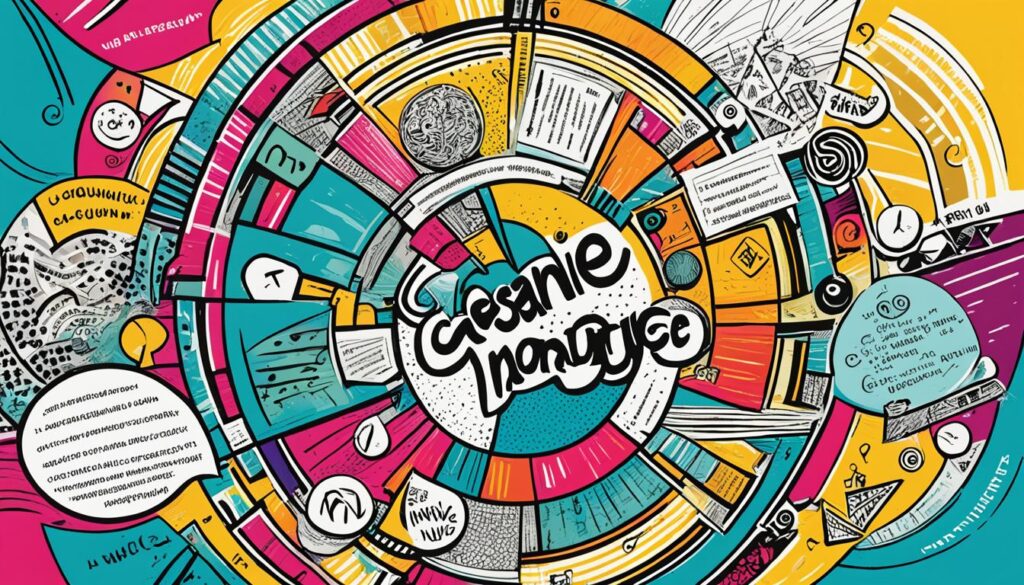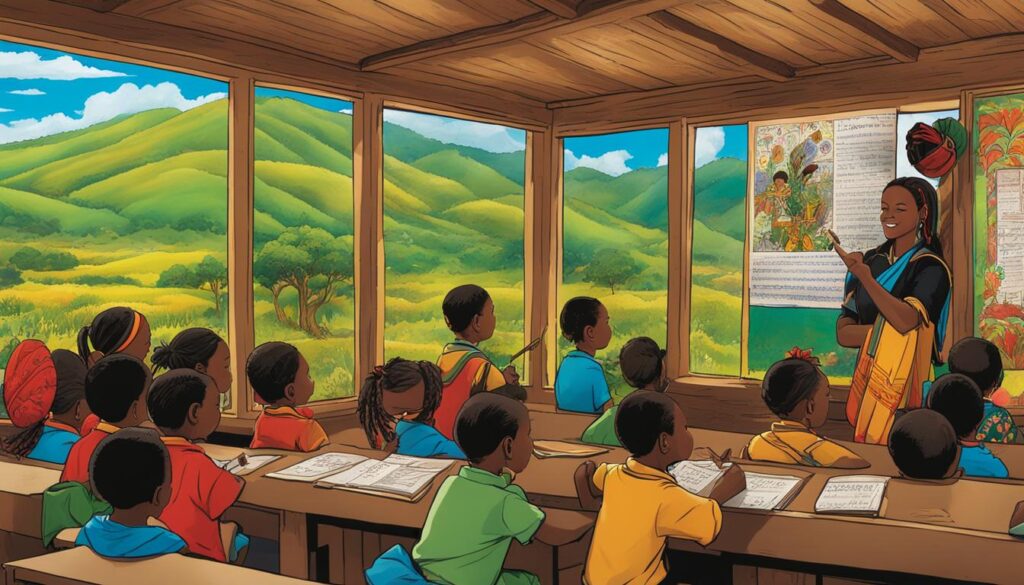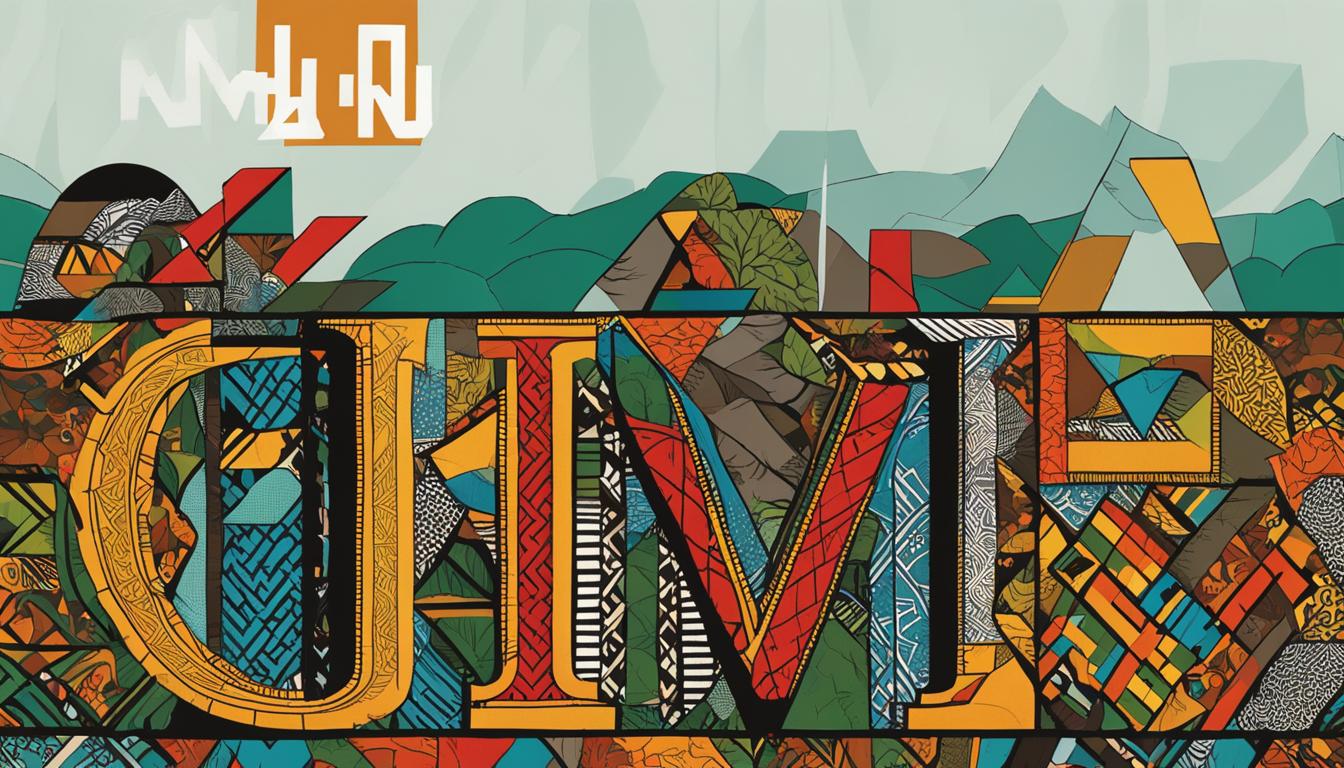Did you know that the Nhungwe language, with over 400,000 speakers, is one of the recognized national languages of Mozambique? This unique dialect, primarily spoken in the Tete region along the southern bank of the Zambezi River, holds immense cultural and linguistic significance. Let’s explore the origins, distinctive features, and preservation efforts of the fascinating Nhungwe language.
Despite its relatively small number of speakers, the Nhungwe language has a rich history and a wide range of linguistic features. It has its own alphabet and phonological system, consisting of 17 noun classes and complex verb morphology. The Nhungwe language is deeply connected to the cultural identity of the Nhungwe people, and efforts are underway to preserve and promote it through translation services and educational initiatives.
In the following sections, we will delve into the history and origins of the Nhungwe language, explore its linguistic features, discover its cultural significance, and uncover the preservation and revitalization efforts being made. We will also discuss the role of Nhungwe language translation services in bridging communication gaps. Join us on this fascinating journey into the world of the Nhungwe language.
History and Origins of the Nhungwe Language
The Nhungwe language has a fascinating history that dates back to ancient times in the Tete region of Mozambique. It originated from the broader Bantu language family, which is known for its widespread usage across Southern Africa. Through centuries of cultural and linguistic interactions with neighboring communities, the Nhungwe people developed their own unique dialect.
“The Nhungwe language is a testament to the cultural and historical richness of the Tete region. It showcases the intricate web of influences that have shaped its development over time.” – Dr. Sofia Mabunda, Linguistics Professor
The Nhungwe language holds deep significance for the Nhungwe ethnic group, who view it as an integral part of their heritage and identity. It represents a connection to their ancestors and serves as a vehicle for preserving traditional knowledge and oral history.
Throughout its history, the Nhungwe language has undergone continual development and adaptation in response to changing social and cultural contexts. Today, it remains a vibrant and living language, serving as a link to the past and a means of communication for the present generation of Nhungwe speakers.
Linguistic Features of the Nhungwe Language
The Nhungwe language showcases a range of unique linguistic features that contribute to its distinctiveness and expressive capabilities. These features include its complex system of noun classes, diverse phonology, and intricate verb morphology.
Nhungwe Noun Classes
One of the prominent features of the Nhungwe language is its elaborate system of noun classes. Noun classes are grammatical categories that assign specific prefixes to nouns to indicate various categories of objects and concepts. In Nhungwe, there are a total of 17 noun classes, each characterized by a unique prefix. This system allows for precise categorization and differentiation within the language.
Nhungwe Phonology
Nhungwe has a distinctive phonological system that sets it apart from other languages. This system encompasses a wide range of consonant and vowel sounds, many of which are not found in other languages. The unique phonetic inventory of Nhungwe adds depth and richness to its pronunciation, contributing to the melodic quality of the language.
Nhungwe Verb Morphology
The verb morphology of Nhungwe is characterized by its complexity and versatility. Verbs in Nhungwe undergo extensive changes through the use of prefixes, suffixes, and extensions to convey various aspects of tense, mood, and subject agreement. This intricate system of verb morphology enables Nhungwe speakers to express a wide range of nuanced meanings and relationships within their sentences.
The linguistic features of the Nhungwe language, including its noun classes, phonology, and verb morphology, contribute to the language’s richness and specificity of expression. These elements provide a unique foundation for communication within the Nhungwe community and represent the linguistic heritage of the language.

Cultural Significance of the Nhungwe Language
The Nhungwe language holds immense cultural importance for the Nhungwe people, serving as a powerful embodiment of their heritage. It is intricately intertwined with their traditions, ceremonies, and oral history, playing a pivotal role in preserving ancestral knowledge and reinforcing social cohesion within the community.
Many cultural practices and rituals are passed down through generations via the Nhungwe language, ensuring their continuity and authenticity. From sacred ceremonies to customary greetings, the language serves as a vessel for transmitting cultural values and fostering a sense of belonging among the Nhungwe people.
“The Nhungwe language is the thread that weaves our traditions, customs, and stories together, connecting us to our roots and strengthening our cultural fabric.” – Elder Ngulube, Nhungwe community
The Nhungwe language is celebrated as a symbol of pride and identity, a tangible representation of the rich cultural heritage that the Nhungwe people proudly share. It is through the language that they express their unique worldview, beliefs, and aspirations, which have shaped their community for centuries.
To ensure the preservation and revitalization of the Nhungwe language, the Nhungwe community is actively promoting its use and encouraging younger generations to embrace their linguistic heritage. Efforts are being made to integrate the language into educational initiatives, cultural events, and community programs, allowing for its continued flourishing in contemporary times.
Through initiatives aimed at safeguarding the Nhungwe language, the cultural heritage of the Nhungwe people is cherished and passed on to future generations, fostering a sense of pride, connectivity, and cultural continuity.
Preservation and Revitalization Efforts for the Nhungwe Language
Recognizing the importance of preserving the Nhungwe language, various organizations and community members are actively engaged in efforts to document, promote, and revitalize the language. These initiatives include the development of educational materials, such as dictionaries and grammar guides, as well as the establishment of language classes and cultural exchange programs. Translation services are also available to ensure the accessibility of Nhungwe literature and facilitate communication with speakers of other languages. These preservation and revitalization efforts aim to safeguard the Nhungwe language for future generations.

Educational Materials and Resources
To support the preservation and revitalization of the Nhungwe language, educational materials are being developed. Dictionaries and grammar guides are created to help learners and speakers deepen their understanding and knowledge of the language. These resources serve as valuable references for Nhungwe language enthusiasts, researchers, and individuals interested in learning the language.
Language Classes and Cultural Exchange Programs
Language classes are organized to teach the Nhungwe language to both native speakers and non-speakers who wish to learn the language. These classes provide a structured environment for individuals to develop their language skills, engage in conversations, and immerse themselves in the Nhungwe culture. Cultural exchange programs further promote the language by creating opportunities for interaction between Nhungwe speakers and other communities, fostering understanding and appreciation.
Translation Services for Nhungwe Language
Translation services play a crucial role in preserving and promoting the Nhungwe language. Professional translators specialize in translating Nhungwe texts into other languages and vice versa, ensuring accurate and culturally sensitive communication. These services enable access to Nhungwe literature, facilitate cross-cultural communication, and promote the use of the Nhungwe language in various domains such as business, education, and healthcare.
Overall, the preservation and revitalization efforts for the Nhungwe language involve a combination of educational initiatives, language classes, cultural exchange programs, and translation services. These collective endeavors aim to secure the future of the Nhungwe language, ensuring its continued use, appreciation, and transmission to future generations.
Nhungwe Language in Contemporary Mozambique
In contemporary Mozambique, the Nhungwe language continues to thrive, predominantly in the Tete region. Despite the growing influence of Portuguese as the official language and the rapid urbanization in the country, Nhungwe remains spoken by a significant number of people, reaffirming its cultural significance and resilience.
The challenges faced by the Nhungwe language in the contemporary Mozambican context necessitate efforts to promote Nhungwe language education and literacy. By prioritizing the teaching and learning of the Nhungwe language, its vitality can be preserved, allowing future generations to maintain a strong connection to their cultural heritage.
Nhungwe language education not only empowers Nhungwe speakers by fostering a sense of pride and identity but also facilitates intergenerational knowledge transfer. Language revitalization programs have been implemented to increase awareness and appreciation of the Nhungwe language, not only among Nhungwe speakers but also within the broader Mozambican society.
The literacy rate in the Nhungwe language is a key indicator of the language’s vitality and the community’s engagement. By improving the literacy rate, individuals can fully participate in the social, economic, and cultural life of their community, reinforcing the importance of Nhungwe language literacy initiatives.
In recognition of the Nhungwe language’s role in preserving cultural diversity, it is imperative to prioritize language education and literacy programs tailored to the needs of Nhungwe speakers. These initiatives will ensure the continued vibrancy and relevance of the Nhungwe language in contemporary Mozambique.
Nhungwe Language Translation Services
As the Nhungwe language is not widely known outside of its native speakers, professional translation services play a crucial role in bridging the communication gap between Nhungwe speakers and those who do not understand the language. Nhungwe language translation services provide accurate and culturally sensitive translations for various purposes, including business, legal, medical, and educational materials.
Whether you need to translate important documents, contracts, or marketing materials into or from Nhungwe, these services ensure that the meaning and intent of the content are preserved, allowing you to effectively communicate with Nhungwe-speaking individuals or communities.
Qualified Nhungwe language interpreters also play a vital role in facilitating communication in various settings, such as conferences, meetings, and community events. These interpreters have a deep understanding of both the Nhungwe language and cultural nuances, ensuring that the message is accurately conveyed while respecting the cultural context.
By utilizing Nhungwe language interpretation services, you can break down language barriers and foster meaningful connections with Nhungwe speakers, whether in professional or social settings.
Benefits of Nhungwe Language Translation Services:
- Accurate translations: Professional translators ensure that the translations are accurate, capturing the nuances and cultural subtleties of the Nhungwe language.
- Cultural sensitivity: Translations are culturally sensitive, respecting the unique traditions, customs, and norms of the Nhungwe-speaking community.
- Effective communication: Nhungwe interpreters facilitate smooth and effective communication in both formal and informal settings, ensuring that everyone can participate and understand.
- Preserving meaning: Professional translation services ensure that the meaning and intent of the original message are preserved, allowing for clear and accurate information exchange.
- Boosting accessibility: By providing translations, Nhungwe language services make important information accessible to a broader audience, regardless of language barriers.
Whether you are a business looking to expand into Nhungwe-speaking regions, a healthcare provider in need of Nhungwe language materials, or an individual seeking to communicate with the Nhungwe community, professional translation and interpretation services are essential.

| Types of Translation Services | Benefits |
|---|---|
| Business translations | • Facilitate international trade • Expand market reach • Foster strong business relationships |
| Legal translations | • Ensure accurate legal documentation • Support legal proceedings • Enhance legal communication |
| Medical translations | • Enable effective healthcare communication • Provide access to medical information • Enhance patient care for Nhungwe speakers |
| Educational translations | • Aid in educational materials localization • Facilitate Nhungwe language learning • Promote cultural exchange and understanding |
Conclusion
The Nhungwe language holds immense cultural and linguistic significance in Mozambique, particularly in the Tete region. It is not just a mere means of communication, but an integral part of the identity of the Nhungwe people. Efforts to preserve, revitalize, and promote this unique language are crucial for maintaining its vitality and ensuring its transmission to future generations.
One essential aspect in the preservation of the Nhungwe language is the availability of translation services. These services play a vital role in bridging the communication gap between Nhungwe speakers and those who do not understand the language. Through accurate and culturally sensitive translations, Nhungwe language translation services contribute to the continued appreciation and celebration of this valuable cultural heritage.
Recognizing the cultural significance of the Nhungwe language has paved the way for various initiatives aimed at its revitalization. Educational materials, language classes, and cultural exchange programs have been developed to promote the use of Nhungwe. By increasing awareness and appreciation among both Nhungwe speakers and the broader Mozambican society, these efforts ensure that the language remains a vibrant part of the community’s cultural fabric.
Preserving the Nhungwe language is not just an endeavor for the present, but an investment in the future. By embracing and supporting the Nhungwe language, we honor the deep roots of the Tete region and contribute to the rich diversity of Mozambique’s linguistic landscape.
FAQ
What is the Nhungwe language?
The Nhungwe language is a unique dialect spoken in Mozambique, primarily in the Tete region, along the southern bank of the Zambezi River. It is classified as a Niger-Congo language and belongs to the Narrow Bantu subgroup.
How many speakers does the Nhungwe language have?
The Nhungwe language has over 400,000 speakers and is one of the recognized national languages of Mozambique.
What is the history of the Nhungwe language?
The Nhungwe language has a long history, dating back to ancient times in the Tete region of Mozambique. It is believed to have evolved from the Bantu language family, which spread across Southern Africa.
What are the linguistic features of the Nhungwe language?
The Nhungwe language exhibits several distinctive linguistic features, including a complex system of noun classes, unique consonant and vowel sounds, and intricate verb morphology.
What is the cultural significance of the Nhungwe language?
The Nhungwe language is deeply intertwined with the traditions, ceremonies, and oral history of the Nhungwe people. It plays a vital role in their cultural identity and is considered a symbol of pride and heritage.
How is the Nhungwe language being preserved and revitalized?
Various organizations and community members are actively engaged in efforts to document, promote, and revitalize the Nhungwe language. These initiatives include the development of educational materials, language classes, and cultural exchange programs.
How is the Nhungwe language used in contemporary Mozambique?
The Nhungwe language is still spoken by a significant number of people, primarily in the Tete region. However, with the influence of Portuguese as the official language and increasing urbanization, efforts to promote Nhungwe language education and literacy are important for its maintenance.
What are Nhungwe language translation services?
Nhungwe language translation services provide accurate and culturally sensitive translations for various purposes, ensuring effective communication between Nhungwe speakers and those who do not understand the language.
